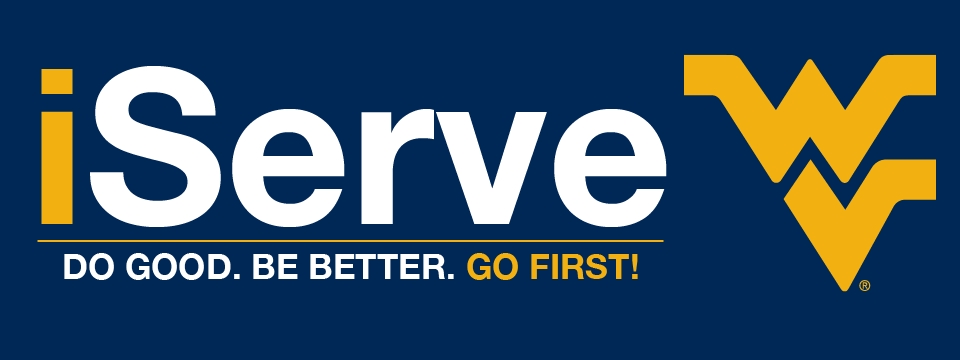iServe Service Recognition Program
Every hour of service is an hour of valuable learning experience that will build community and allow students to grow and explore. The WVU Center for Community Engagement celebrates your growth through the iServe Service Recognition Program.
Students meeting benchmarks during the service year will be recognized as outlined below. The service year runs from May 1 – April 30.
Certificates
Students who complete at least 50 hours of service growth during the service year will receive a Certificate of Recognition from the Governor of West Virginia.
Pins
Students who grow through service may also be eligible to receive a WVU Service Pin. In addition to completing the required service, students who would like this pin will also write a brief reflection on their service. Each student can receive one pin per year. Those qualifying for a recognition pin will receive the highest pin they qualify for.
Blue Pin – 100 hours
Silver Pin - 150 hours
Gold Pin – 200 hours
Graduation Cords
Students receiving an undergraduate degree who complete a total of 400 hours of service growth while a student at WVU are eligible to receive and wear Service Graduation Cords during their graduation ceremony. Students who would like graduation cords will also write a brief reflection on their service.
Reflection
Students will be notified when it is time to write a reflection for the recognition program. Keeping the desired service outcomes in mind (see outcomes below), students will choose one of the following topics and use an associated question or questions to guide their reflection. The reflection should be thoughtful and concise – no more than 250 words. Alternatively, students may use the reflection question(s) to create a visual or audible reflection in their chosen medium.
1. Reflect on your sense of belonging in the community. What connections did you make because of your service? What did you learn about your community? What does belonging to a community mean to you?
2. Reflect on the differences and similarities of others to yourself and reflect on your worldview. What did you learn about yourself? About others? In what ways has your view of the populations that you serve changed? What has meeting new people meant to you?
3. Reflect on the needs of your community. Why is it important to listen to the needs of the community? What are the most important takeaways from your service? What strengths do you feel you bring to your community?
4. Reflect on your values, purpose, and future. How has your service influenced your values or purpose? How has your service aided in your exploration of your career goals? What have you learned about yourself? Will you continue to be involved in service?
5. Reflect on your ability to make a difference. What do you bring to the table? How have you grown through service? How have your ideas or actions made a difference?
Service should support the following outcomes:
- Creates a sense of belonging in the community. A sense of belonging makes you feel safe and supported and encourages you to care about the people and places around you.
- Educates about the differences and similarities of others; expands your worldview.
- Improves the quality of life for community residents and meets their stated needs.
- Aids in identity exploration, including values, purpose, and career paths.
- Increases self-efficacy (i.e., a belief that your voice has value and can make a difference) and self-confidence.
Notes
Certificates and pins will not be awarded retroactively. Students must submit hours by the end of the service year (April 30) to receive their recognition pin or certificate. The graduation cords program will count all service entered into iServe by April 30 of the graduation year for spring graduates and by December 1 for winter graduates.
Transfer students with fewer than four years at WVU will need to complete at least 100 hours for each year they are a student to qualify for graduation cords, but this service can occur at any time during their tenure. For example, a student who transfers to WVU as a sophomore and is a student for three years can complete 50 hours during their sophomore year, 150 hours during their junior year, and 100 hours during their senior year to qualify.


